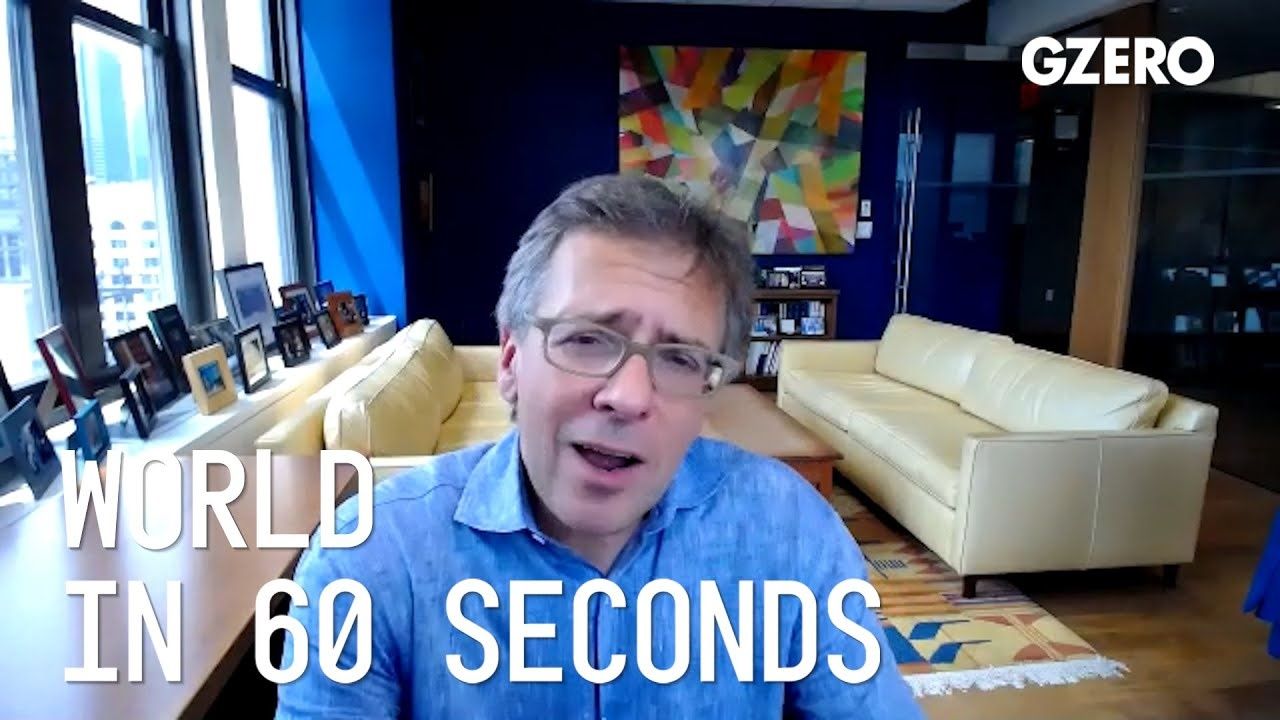
Ian Bremmer shares his perspective on global politics on this week's World In (More Than) 60 Seconds:
Jair Bolsonaro, the president of Brazil, has coronavirus. What are your thoughts and where does this leave Brazil?
Well, I mean, you know, if coronavirus was karmic, and I don't believe that, Bolsonaro would be the president you kind of expect would get it, right? Because he's been saying, "it's just a little flu, don't worry about it, I don't need to wear a mask, everyone can come out and rally, we can hug, we can hold hands, we can shake hands with no problem." He's been doing that for months now and he's exposed to an awful lot of people, both in Brazil and internationally, including in the United States when he traveled to meet with President Trump in Mar a Lago. And now he's taken the test. The 65-year-old president has coronavirus.
He's saying, "I'm fine. Look at me. Look at my face. There's no problem." I hope he's fine. You don't wish ill health on anybody, but you also kind of hope that someone who has gotten it this wrong, with well over 50,000 dead in Brazil, with some of the worst case load of any country in the world after the United States, Brazil is right there with us, and per capita looks considerably worse and their hospitals are starting to get overwhelmed and his popularity is going down. And, you know, their ability to manage this effectively and also keep the economy going is really, really challenged. So, I mean, I've said it before. I'll say it again, among Democratic presidents, Jair Bolsonaro is by far been the worst in handling coronavirus on the health care side, on the cheerleading side, on the fake news side and on the economic side. He's kind of got everything going against him. He's just not handled this well.
Brazil does have a lot of strong governors that do have a strong and reasonably independent judiciary, which has helped the country a lot. Bolsonaro also now is in the middle of growing impeachment cases surrounding him and his family, some of which involves corruption. That's going to dog him for the rest of his term. It's possible he'll even be thrown out like his predecessors, but if not, it's hard to imagine that he's going to be reelected. Brazil is, after all, still a democracy. So, horrible to see all this news in a country that really should be doing pretty well, all things considered. But poor governance makes a real difference, especially in a crisis.
There was an assassination attempt on Canadian Prime Minister Justin Trudeau. What's the story?
I'm stunned that the American media has said virtually nothing about this. This was an extremist from Manitoba who gets in his pickup truck, he drives to the prime minister's residence, breaks through the gates with a bunch of, like heavy rifles, like machine guns, and Trudeau is not home, thankfully, and the guy doesn't do great research, thankfully. Turns out to be some QAnon inspired nut job. And the Canadian police, rather than firing on him and killing him, which probably would have happened in the United States and a lot of other countries, actually managed to talk him down and apprehend him. But it's not making much news. I mean, I've talked about it with friends and colleagues here in the United States, it's the first they've heard of it. And I'm honestly a little surprised. I mean, I know that a lot most Americans don't have passports. They don't travel. We don't pay attention to news that isn't in the United States. And Trump dominates everything. But I mean, Trudeau's been covered like America's boyfriend for the last five years by the mainstream media.
You would think an assassination attempt against him would drive coverage in the US. And it really isn't. And it really should. Because, of course, you know, even though we don't have nearly as much of an international terrorist issue in the United States and in Canada as we did say in 9/11 days, we have a very significant domestic terrorism problem in the United States and Canada. And it's been growing. And we're going to need to deal with it. And, you know, thank God that this guy is not only an ideological nut job, but also doesn't know how to plan an assassination, or we could have very, very different news right now from our friendly neighbors to the north.
Finally, Australia resumes lockdown. How are they handling the pandemic?
And the answer is, reasonably well. You know, they are locking down the border between their two largest provinces. They've not done this an enormously long period of time. And it's because there is serious outbreak. But I mean, this is way earlier than you're seeing in the United States. They've largely been following the scientific guidelines from their own health minister, their own government. And that means that when you see an expansion, you shut everything down. And that's helped the Australian numbers overall to be comparatively limited. And it gives them a handle on the spread. They're not doing the job that New Zealand is, much more isolated, shut down their borders completely. All these billionaires that bought their luxury boat holds and now can't even get to the land they own because New Zealand doesn't want a more coronavirus. Australia doesn't have that. They've got economic problems, too, because increasingly there's a trade war happening between Australia and China with an enormous amount of trade and investment going there. But in terms of general governance around coronavirus, Australia not being cheerleader's, not politicizing this overtly, doing a reasonable job. And hopefully that will continue with this response to recent outbreaks.